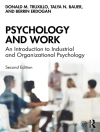Essential Psychology provides a thorough and accessible introduction to the field of psychology. Written by a team of expert authors, this book warmly welcomes you to all the areas covered on British Psychological Society accredited degree courses.
It includes chapters focused on evolution, memory, thinking and reasoning, motivation and emotion, development, and personality. New to this Fourth Edition are two chapters which focus on racism in psychology and LGBTQ+ psychology. It applies psychological theory to the real world, and includes a wealth of learning features to support your learning, including critical reflections and discussion questions that nurture creative thinking beyond the syllabus.
This is the ideal introductory textbook for undergraduate students of psychology and those undertaking a Master′s conversion course in psychology.
Inhaltsverzeichnis
SECTION A: The Foundations of Modern Psychology: What We Know About Human Beings
Chapter 1: Once Upon a Time … The Evolution of Human Behaviour – James Stiller and Philip Banyard
Chapter 2: How Psychology Became a Science – Sarah Buglass, Lydia Harkin, Peter Macaulay, Luke Vinter, Rosie Daly, and Noor Ali
Chapter 3: Psychology, Racism and Coloniality – Phil Banyard and Emeka Okoli
Chapter 4: The Replication Crisis – Mark Andrews and Lucy Justice
SECTION B: Cognitive Psychology: How We Think and Make Sense of the World
Chapter 5: Memory – Thom Baguley, Nikolas Pautz, Harriet Smith, Lucy Justice and Duncan Guest
Chapter 6: An Introduction to Sensation, Perception and Attention – Andrew K. Dunn, Paula C. Stacey and Kate Roberts
Chapter 7: Learning – Andrew Mac Kenzie and Phil Banyard
Chapter 8: Problem Solving and Reasoning – Gary Jones, Georgina Gous, Mark J.T. Sergeant, Antonio Castro and Angharad Williams
SECTION C: Biological Psychology: How Our Brains Affect Our Behaviour
Chapter 9: The Human Nervous System: Functional Anatomy – Antonio Castro, Gary Jones, Mark J.T. Sergeant and Samuel Jones
Chapter 10: Communication within the Brain – Lucy Webster, Rachel R. Horsley and Christine Norman
Chapter 11: Motivation and Emotion – Sebastiano Costa, Joshua Baker, Preethi Premkumar, Pancy Poon and Nikki Stevenson
SECTION D: Social Psychology: How We Interact with Each Other
Chapter 12: Behaviour within Groups – Mhairi Bowe and Juliet Wakefield
Chapter 13: Behaviour between Groups – Juliet Wakefield and Mhairi Bowe
Chapter 14: Social Judgements and Behaviour – Sebastian Teicher and Maria Kontogianni
SECTION E: Developmental Psychology: How We Grow and Change
Chapter 15: Development during the Early Years – Lucy Betts, James Stiller, Rebecca Larkin, Gareth Williams and Kate Ellis-Davies
Chapter 16: Development during the School Years – James Stiller, Lucy Betts, Rebecca Larkin, Gareth Williams and Emma Aquadro
Chapter 17: Atypical Child Development – Lai-Sang Iao, Matthew K. Belmonte, Gayle Dillon, Andrew Grayson and Susannah Lamb
Chapter 18: Adulthood to Ageing – Olatz Lopez-Fernandez, Rebecca Stack, Suvo Mitra and Louise A. Brown Nicholls
SECTION F: The Psychology of Individual Differences: How We Know and Measure Our Individuality
Chapter 19: Personality – David J. Wilde, Nadja Heym, Loren Abell, Glenn A. Williams, and Emanuele Fino
Chapter 20: Psychopathology – Sarah Mc Donald, Palwinder Athwal-Kooner, Karen Slade and Michael Underwood
Chapter 21: LGBTQ+ Psychology – Mollie Baldwin, Liam Cahill, Sally Evans, Anthony J. Gifford, Bryony Harper, Bethany A. Jones, Mohammad Malik, Daragh T. Mc Dermott, Chase Staras, and Belinda Winder
Chapter 22: Self – Jill Arnold, Ben Oldfield and Filipa Da Costa Rico Calado
SECTION G: Applied Psychology: How We Use Psychology
Chapter 23: Psychological Interventions – Karen Slade, Palwinder Athwal-Kooner, Sarah Mc Donald and Simon Scott
Chapter 24: Health Psychology – Kristina Newman, Rebecca Stack, Mike Rennoldson, Eva Zysk, Eva Sundin and Preethi Premkumar
Chapter 25: Forensic Psychology – Rebecca Lievesley, Sebastian Teicher, Lorraine Smith and Ellie Woodward
Chapter 26: Language and Literacy – Jens Roeser, Clare Wood, and Hannah Phelan
Über den Autor
Belinda is a Reader in Forensic Psychology. She teaches primarily within forensic psychology, with specific focus on sexual crime. She has a strong background in psychometrics and individual differences, and retains her enthusiasm for quantitative research (continuing to teach multivariate statistics in what she hopes is a fun and interactive manner). Her research is leading her to incorporate qualitative research methods as she continues to develop a programme of research in collaboration with HMP Whatton (the largest sex offender prison in Europe) that makes a significant and practical contribution to our understanding of sex offenders and sexual crime. Additional areas of interest (both in terms of teaching and research) include the psychology of fraud, lying and deception.












